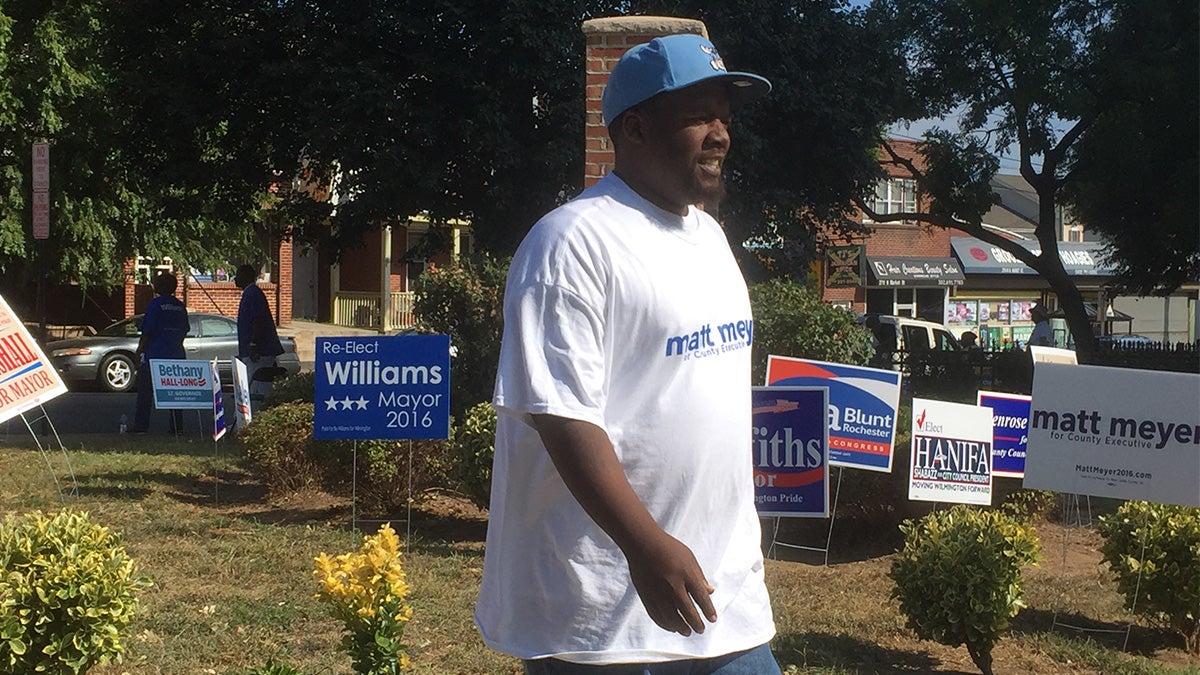Ex-offenders head to polls during Delaware primaries

Haneef Salaam smiled as he walked to the polling station to vote for the first time. (Zoe Read/Newsworks).
Ex-offenders went to the polls Tuesday during Delaware’s primary elections.
When Haneef Salaam walked out from behind the blue curtain of the polling booth at Crestview Apartments in Wilmington Tuesday morning poll workers cheered and congratulated him.
For years he couldn’t vote because he owed more than $100 in judicial fees related to drug charges, for which he served time between 1999 and 2004.
“It felt so good, everyone was happy for me. I was shocked, I didn’t think they would be so happy to see someone voting for the first time,” Salaam said. “It felt awesome, I felt so empowered to be able to have my voice heard for the first time ever.”
This year Gov. Jack Markell, D-Delaware, signed legislation permitting ex-felons to vote prior to paying any fines related to their charges. Previously, they couldn’t vote until all fines were paid—which could take years, depending on their financial situation.
On Tuesday, several individuals headed to the polls in Delaware’s primary elections, thanks to the new law.
“Now is the time to bring in new leadership,” Salaam said. “We have a lot of new, fresh candidates who are trustworthy and have leadership experience.”
The legislation, sponsored by State Sen. Margaret Rose Henry, D-Wilmington, and State Rep. Helene Keeley, D-Wilmington, is about 15 years in the making—and Delaware is the 40th U.S. state to adopt such a law.
Prior to 2000 anyone convicted of a felony permanently lost their right to vote in Delaware. Following that year, ex-offenders could vote five years after release from prison and after paying all their fines.
In 2013 the General Assembly amended the Delaware constitution to remove the five-year waiting period.
However, many ex-offenders still were denied access to voting because they had to wait until they paid what could be thousands of dollars in fees—which for some, could take a lifetime.
Salaam wanted to run for Wilmington City Council in 2008, and didn’t learn he was ineligible until he registered to be a candidate. He said he believed community service eliminated his fees. “It was heartbreaking, because I already had started a campaign, I had a team, we had begun fundraising, and I was getting a lot of word-of-mouth support,” Salaam said.
He said he likely won’t run for office again, but is pleased he can have a say in elections.
“Our city needs new leadership, and I feel so elated I am able to have a say in who will be our next mayor, who will sit on city council, and I hope everybody who is registered get out and vote,” Salaam said.
“This 10 minutes has been the best 10 minutes of my week so far.”
There still is some confusion during the process, however.
Wilmington resident Richard Frink arrived at the polls at Bayard Middle School excited to vote—but he was surprised and devastated to learn his former conspiracy charge is a disqualifying felony. He wasn’t informed until he called the Department of Motor Vehicles in the hallway after poll workers said his name wasn’t on the list of registrants.
“It aint working as it’s supposed to. I’m not no rapist, I aint smacked nobody or killed nobody, so what’s the issue? There’s no justification,” said Frink, who was released from prison 10 years ago. “I’ve been busting my butt for the past six years. I’m not out here selling drugs.”
State Election Commissioner Elaine Manlove said her office notifies registrants if they’re disqualified within days of registration—but Frink said he received no notification.
“The system doesn’t work for the people. You need more people who are for the people, to step in the position and get the kinks out,” Frink said.
Other residents said the word needs to get out about the law change and eligibility. Mike Mawhinney of Selbyville, who was incarcerated between 2010 and 2013 for possession with intent charges, said he believed he and other ex-offenders are banned from voting for life. He said he paid all his fines about two years ago, and would have likely been eligible to vote.
“It would have been nice to know that,” Mawhinney said. “I definitely would have voted if I was aware of it.”
Salaam said he urges ex-offenders to find out if they’re eligible to vote and register to vote before the Oct. 15 deadline for the November general elections.
“It’s important,” he said. “We have an opportunity to allow our voices to be heard, and I think we should take advantage.”
WHYY is your source for fact-based, in-depth journalism and information. As a nonprofit organization, we rely on financial support from readers like you. Please give today.





